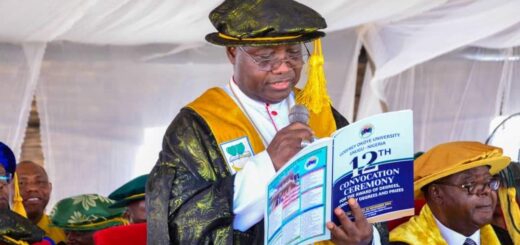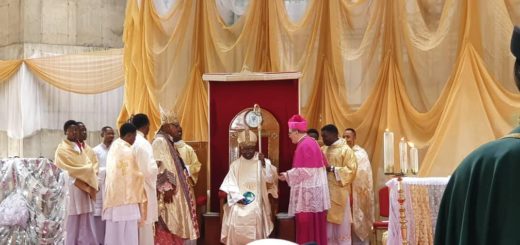OPENING ADDRESS OF THE FIRST CBCN PLENARY, 2017
OPENING ADDRESS OF THE FIRST PLENARY, CATHOLIC BISHOPS’ CONFERENCE OF NIGERIA, AT OUR LADY QUEEN OF NIGERIA PRO-CATHEDRAL ABUJA, 5TH MARCH 2017, BY MOST REV. IGNATIUS A. KAIGAMA, ARCHBISHOP OF JOS AND PRESIDENT CATHOLIC BISHOPS’ CONFERENCE OF NIGERIA.
Dear brothers and sisters,
Since the Catholic Bishops met in September 2016 at our last plenary in Ondo, our Apostolic Nuncio, Archbishop Augustine Kassujja who served the Nigerian Church for over six years with admirable dedication has been transferred to Belgium where he is now Nuncio. We wish him a very fruitful and happy apostolate. Msgr. Javier Domingo Fernandez Gonzales is currently the charge d’Affaires ad interim. We assure him of maximum cooperation. Last December, Archbishop Felix Alaba Job clocked 50 years as a priest, while Bishop Hilary celebrated his 70th birthday this January. To both of them we say hearty congratulations! The ordination of Most Rev. Philip Davou Dung as Bishop of Shendam, on the 11th of January has added to our number and we congratulate him.
We recall, with gratitude to God, the successful prayer event held here in Abuja attended by representatives of the faithful from all the nine Ecclesiastical Provinces in the country to mark the end of our Year of Mercy at the national level. The colloquium on the Catholic Church and Pentecostalism co-sponsored by the German Bishops’ Conference and the CBCN held at DRACC on 14th November, 2016 has also came and gone successfully. This was another step in our ecumenical journey which has opened more avenues for greater dialogue and understanding not only with Pentecostal Christians but also with members of other denominations. Our earnest desire is to see the Christian Association of Nigeria (CAN) return to its original mission and vision by promoting Christian unity, harmony and mutual understanding among the different Christian groups. After a fruitful discussion with the national leadership of CAN, we are sincerely optimistic that the way has been paved for a more meaningful and enduring participation of the Catholic Church in the national activities of CAN. CAN must be stronger, more credible and prophetic, and devoid of the distractions of material or political interests. Christian leaders must focus more on initiatives that promote ecumenical unity; speak a united voice on serious national issues and not in disjointed prophetic utterances that are sometimes not more than mere personal political or commonsensical projections.
As part of the effort of the Catholic Church towards a new evangelization, a pan African Congress on Missiology was successfully held in Lagos, 25-29 October, 2016. To foster a deeper Marian spirituality among our people, the Bishops have consistently urged personal, family and group devotions to our Blessed Mother, with the use of the holy rosary as a powerful tool to attract God’s mercy upon our families, our Church and our beloved country. In this light and in view of the forthcoming centenary of the Marian apparitions in Fatima, Portugal, the CBCN has declared 2017 as a national Marian Year. All Catholics are expected to fervently pray for the intercession of our Blessed Mother to save our country from social evils. The Bishops have approved a national Marian Congress to be held in Benin City from 12-14 October 2017 and we expect a great participation of Nigerian clergy, religious and laity at the occasion during which we hope to re-dedicate Nigeria to the Immaculate Heart of Mary.
The CBCN has taken time to study and review the activities of the Pilgrimage Centre of Eucharistic Adoration and Special Marian Devotion, Elele. Upon the recommendation of the Local Ordinary of Port Harcourt Diocese and the Metropolitan of Calabar Ecclesiastical Province and of the relevant committees charged with examining the Centre, the CBCN has, in accordance with canon 1232, approved the statutes of and granted the Centre a national approval and recognition as a place where Catholics and indeed all who love and seek God can come together to worship God in the Eucharist and express true devotion to the Blessed Virgin Mary, in conformity with the orderliness and discipline of Catholic doctrines and traditions.
In the spirit of the new evangelization we urge all parish societies to take their roles seriously. Chaplains should make themselves more available to give guidance to members of Church societies and priests should be involved more keenly in the teaching of our faith (catechesis). We note the great advantage of some personal initiatives like the commendable Lumen Christi Television project of Prince Soji Olagunju, operating on channel 350 of the DSTV, the family apostolate of Sir David Osunde aimed at helping families to live like the Holy Family of Nazareth, etc. to the Church. Similarly, some priests and religious have some credible pastoral and spiritual initiatives as a way of fostering the Catholic faith and identity. Such initiatives must be acknowledged as blessings for our Church as long as they meet the criteria established by St. Paul for the use of individual gifts, namely, orderliness, discipline and service for the common good and not for the promotion of personality cult.
Permit me to reflect on some social issues like the frequent statement one hears even from some highly placed Nigerians that “only prayer can solve the problems of Nigeria”. The statement may be true in one sense but in another it is not only a fallacy but a passing on of the buck. St. James says prayer and good works must go together. Leaders must therefore not abandon their social responsibilities by amassing incredible wealth, taking from the poor and yet thinking that it is God’s duty to care for the poor, the helpless youths, and the needy. There is a raging fire going on and all we say are prayers and more prayers instead of also looking for a bucket of water to quench the fire! We worship God in exotic places of worship spread all over, but fail to seek permanent social remedies to our national maladies.
The lesson to be drawn from the recent Southern Kaduna circle of attacks is that we intentionally, as a nation, hardly get into the root causes of crucial matters. Our approach is often lackadaisical, parochial or indifferent tinged with sentiments of ethnicity, regional interests and religious bias instead of patriotism and thus crippling efforts at practical solutions. A clear policy followed by concrete and creative measures on how to stop the menace of herdsmen is long expected from the presidency and yet the herdsmen become so fierce and assertive! Could the same zeal used in tackling Boko Haram not be applied? Sambisa forest has fallen, but when will the empires of kidnappers and the marauding herdsmen fall?
We no doubt commend the positive achievements by the Buhari administration in fighting insurgency and the renewed consciousness brought to Nigerians about the evil of corruption and the social paralysis it inflicts on us all. Unfortunately, it is true as our dear President pointed out that if you fight corruption, corruption will fight back. This is what seems to be happening. Corruption has remained hydra headed and refused to be tamed in Nigeria. At the top, centre, bottom, sides, corruption has taken firm roots that it will take more than just wishful political talk to expel it from our psyche. The elders have seemingly perfected the art of corruption and the youths as good copy-cats have unfortunately keyed in and see no problem with it. Like a menacing cancer it has spread even to religious bodies and judicial organizations; it is found in the market places, among officers of the law, security agents, and those in and outside government; it is cascading dangerously on all aspects of our life. Today it means nothing to swear an affidavit in a court to change one’s year of birth so as to elongate one’s civil service career; some parents pay and negotiate with school authorities so that their children who have failed exams can be facilitated to pass. Even very young school children know this and would wonder why the parents of some other children have not influenced their results! It is now clear that the culture of corruption is very deep and no single leader, no matter how well intentioned can enforce and win a war against it in Nigeria. We need to act together and go back to the basics of family values, moral education and witnessing by example even in such small things as keeping to time.
Also, a culture has remained with us whereby criminals are defended or vindicated and even celebrated so that convicting them does not appear as an indictment or portrayal of their political, ethic or religious constituencies in negative light.
We Bishops are not merely armchair observers of the great suffering caused by the uncontrollable inflation caused by the present economic recessions. We have been at the grassroots with the suffering masses. It is not in doubt, for example that Bishops and priests among us have and are still there with the Boko Haram victims in Yola, Maiduguri, Yobe and far away Cameroun and other hot spots like southern Kaduna, Agatu, Nimo, Niger Delta. To our greatest surprise and chagrin, we hear that some unscrupulous officials divert funds or relief materials meant for victims of crises! We plead that the federal government should not only allocate significant resources for the rehabilitation of those displaced but ensure that no one person or group is allowed to steal from these poor and traumatized Nigerians again!
Our country is full of fresh and brilliant but abandoned ideas. We often begin some things well but we scarcely pursue them to a logical conclusion for the benefits of all. Can you recall how some noble policies as the compulsory use of seat belt, helmet, control of speed limit, identity card for all Nigerians, National poverty eradication programme (NAPEP), War against indiscipline (WAI), Operation Feed the Nation (OPN), (don’t mind the imported plastic rice saga today), the free feeding programmes in schools, prison welfare, Sure – P, registration of Mobile phone numbers, installation of CCTV cameras, functional street lights, investigation of murder cases, etc. All started well but ended without any meaningful and verifiable results. Only God knows what the recent “whistle blowing” policy will amount to. Worse of all is the zero culture of roads and infrastructural maintenance. Many roads are built at over valued contracts, the job is poorly done, and once “completed” they never ever receive any prompt attention again until they are riddled with valleys and rivers and accidents claim so many lives before new inflated contracts are awarded again! What about the government Commissions of enquiries, panels of investigations whose reports never see the light of day. This was the case with the expensive national conference held some two years ago, not to talk of the Oputa panel.
Dear compatriots, we cannot give up on our beautiful country blessed by God and destined for higher heights. We as religious leaders will continue to call for sanity in the equitable distribution of national resources with reciprocal patriotic attitudinal behaviour by citizens. We shall do our part, constantly examining where and how we have gone wrong and we expect all Nigerians to do a search of conscience and resolve to do only what is right, noble and honourable. I pray that our discussions and prayers during our conference will not only help us to contribute to the renewal of Christianity in Nigeria, but also to achieve a new national rebirth anchored on true love and genuine service to God and neighbour. We commend our President His Excellency Muhammadu Buhari to your prayers for God’s healing and speedy recovery as well many other Nigerians suffering all manners of illnesses. So, help us God.
Now on behalf of the Catholic Bishops’ in Nigeria and by God’s special grace I happily during this first Sunday of Lent declare our first CBCN plenary conference for 2017 open.




